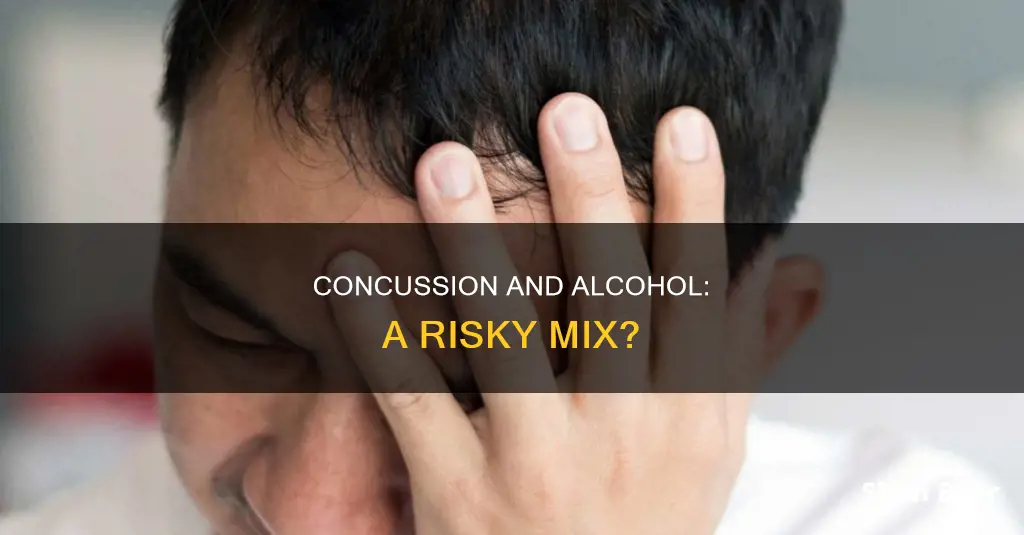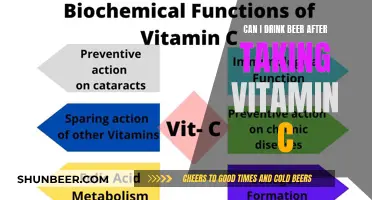
Drinking alcohol after a concussion is not recommended by medical professionals. Alcohol is a neurotoxin, which means it can damage brain cells. It can also negatively impact cognition, including concentration, problem-solving, memory, and learning. Additionally, alcohol consumption can increase the risk of seizures in individuals with traumatic brain injuries (TBIs). It is advised to refrain from drinking alcohol until fully recovered from a concussion, as it may slow down the healing process and increase the chance of sustaining another injury.
| Characteristics | Values |
|---|---|
| Drinking alcohol with a concussion | Not recommended |
| Alcohol's effect on the brain | Disrupts normal functioning, impedes healing, exacerbates symptoms |
| Alcohol consumption and the risk of a second concussion | Impaired balance, coordination, and judgment increase the risk of falls or accidents |
| Potential consequences of drinking alcohol with a concussion | Delayed healing, increased symptoms, higher risk of further injury, impaired cognitive function |
| Alcohol consumption and post-concussion syndrome | Worsens symptoms such as headaches, dizziness, and cognitive difficulties |
| Alcohol as a neurotoxin | Can poison the brain and nervous system |
What You'll Learn

Alcohol can slow down or stop recovery from a concussion
While there is no definitive research on the impact of alcohol consumption on concussion recovery, medical professionals advise against drinking during this period. Alcohol is a neurotoxin, which means it can damage brain cells and negatively affect brain chemistry. When the brain is healing from a concussion, even moderate alcohol consumption can have adverse effects.
Impaired Brain Function
Alcohol consumption can impair brain function, particularly in individuals recovering from a concussion. It can worsen symptoms such as headaches, dizziness, balance issues, cognitive difficulties, and sleep disturbances. The effects of alcohol on the brain can last from days to weeks after drinking stops.
Increased Risk of Injuries
Alcohol impairs balance, coordination, and judgment, increasing the risk of falls or accidents that could lead to a second concussion or worsen an existing injury. Additionally, drinking alcohol can make it more challenging to assess an individual's recovery progress and determine when it is safe to return to normal activities.
Negative Impact on Cognition
Alcohol can negatively impact cognitive skills such as memory, concentration, problem-solving, and flexible thinking. It may also worsen pre-existing mental health issues, such as depression, and increase the risk of emotional problems.
Interference with Medications
Drinking alcohol while taking prescription medications can be dangerous. Alcohol can interact with medications, reducing their effectiveness or enhancing their effects, potentially leading to overdose or other serious complications. This is especially important to consider for individuals taking antidepressants or medications for anxiety, pain, or sleep.
Risk of Seizures
People recovering from a concussion are already at an increased risk of seizures, and alcohol consumption may further elevate this risk. Seizures can have long-term consequences, including losses in visual memory, attention, problem-solving, and perception.
In summary, alcohol consumption during the recovery period from a concussion is not recommended. It can slow down or impede the healing process, worsen symptoms, and increase the risk of further injuries. It is best to abstain from alcohol until fully recovered and always consult with a healthcare professional for personalized advice.
Lactic Acidosis in Beer: Lab Work Indicators
You may want to see also

Drinking with a concussion can increase the risk of further injury
Drinking alcohol after a concussion is not recommended, as it can negatively impact your recovery and increase the risk of further injury.
Alcohol is a neurotoxin, which means it can damage brain cells. When the brain is already healing from a concussion, drinking alcohol can disrupt this process and prolong recovery. The effects of alcohol on cognition and mental health can also be more pronounced when the brain is injured. Alcohol consumption can worsen symptoms such as concentration problems, memory issues, and depression.
Additionally, alcohol impairs balance and coordination, increasing the risk of falls and accidents that could lead to a second concussion or further injury. This is especially true when combined with prescription medications, as alcohol can increase their effects and lead to overdose or other dangerous consequences.
Furthermore, people with traumatic brain injuries (TBIs) are at an increased risk of seizures, and alcohol consumption may trigger or increase the likelihood of seizures.
It is important to note that even a small amount of alcohol can be harmful, as the brain is more sensitive to its effects after a concussion. Therefore, it is recommended to abstain from alcohol until you have fully recovered and received clearance from a healthcare professional.
In summary, drinking with a concussion can increase the risk of further injury, impair brain healing, and exacerbate symptoms. To promote optimal recovery and reduce the chances of complications, it is best to refrain from alcohol consumption until you have completely recovered from your concussion.
Drinking Beer on Manhattan Streets: Is It Legal?
You may want to see also

Alcohol can negatively impact cognition and increase depressive symptoms
Alcohol is a neurotoxin, which means it can damage brain cells and negatively impact cognition. It interferes with the brain's communication pathways, affecting mood, behaviour, clear thinking, and coordination. This disruption can be particularly detrimental for individuals recovering from a concussion, as it can slow down the healing process, worsen symptoms, and increase the risk of further injuries.
The effects of alcohol on cognition are well-documented. Alcohol can negatively impact an individual's concentration, problem-solving abilities, memory, and ability to learn new information. These cognitive effects can be especially pronounced in those recovering from a concussion, as they may already be experiencing difficulties in these areas due to their injury.
In addition to the cognitive impacts, alcohol consumption can also increase depressive symptoms. This is a significant concern for individuals with concussions, as they may already be experiencing mood changes and emotional challenges as part of their post-concussion symptoms. Alcohol can further disrupt their brain chemistry, leading to an increased risk of depression and other mental health issues.
The relationship between alcohol and brain injuries is complex. While some studies suggest that alcohol may have a protective effect in more severe forms of traumatic brain injury (TBI), the overall consensus is that alcohol consumption during the recovery period is detrimental. Alcohol can impair normal inhibition, alter motor control, and disrupt sleep, all of which can increase the risk of sustaining a concussion or experiencing a repeat injury.
Furthermore, alcohol consumption can negatively impact overall health and recovery. It can contribute to unhealthy weight gain, increase the risk of diabetes, high blood pressure, stroke, and dementia. It can also lead to alcohol dependence and increase the risk of mental health issues such as depression and anxiety. Therefore, it is generally recommended to abstain from alcohol consumption during the recovery period from a concussion to ensure optimal healing and reduce the risk of complications.
Beer and Paxlovid: Is It Safe to Drink?
You may want to see also

Alcohol is a neurotoxin which can damage brain cells
Alcohol is a neurotoxin, which means it can damage brain cells. It can cross the blood-brain barrier and directly affect neurons, disrupting communication between them. This disruption can lead to intellectual impairment, memory loss, slowed thinking, and difficulty concentrating.
Alcohol can also affect the functions of brain cells by altering hemodynamics (blood flow patterns across the brain) and neurovascular coupling (the connection between neurons and blood vessels supplying them with oxygen). This can result in pressure on other areas of the brain and further impair cognitive function.
Additionally, alcohol can interfere with neurogenesis, the process of generating new brain cells. It can also lead to a thiamine deficiency, causing a neurological disorder called Wernicke-Korsakoff syndrome, which results in confusion, memory loss, and loss of muscle coordination.
Chronic and heavy alcohol consumption can cause permanent brain damage, including brain shrinkage and the destruction of neurons. This can lead to a decrease in overall brain volume and disrupt the normal functioning of brain regions, including the prefrontal cortex, hippocampus, and cerebellum.
Alcohol's neurotoxic effects can also increase vulnerability to dementia and trigger inflammation and oxygen deprivation in the brain. It can also cause wiring damage and interfere with receptor signaling and neurotransmitter activity.
Overall, while alcohol may not kill brain cells directly, it can have significant negative impacts on brain health and function, especially with chronic and heavy consumption.
Exploring Italy's Drinking Culture: Beer and Minors
You may want to see also

Alcohol can increase the risk of seizures
Drinking alcohol after a concussion is not recommended. Alcohol is a neurotoxin, which means it can damage brain cells and negatively impact brain chemistry. It can also affect your balance and coordination, increasing the risk of falls or accidents that could lead to a second concussion or worsen the existing injury.
Furthermore, alcohol consumption can increase the risk of seizures in individuals with traumatic brain injuries (TBIs). The Model Systems Knowledge Translation Center (MSKTC), a resource for patients and caregivers, notes that drinking may increase the risk of seizures and can trigger them. Seizures can have long-term consequences, including losses in visual memory, attention, problem-solving, and perception. Therefore, it is crucial to refrain from alcohol consumption to reduce the risk of seizures and promote the healing process after a concussion.
The effects of alcohol on individuals with brain injuries require further study. However, it is known that alcohol can alter brain chemistry, making us feel relaxed or sad. It can also impair normal sleep patterns and increase the risk of concussion. Additionally, alcohol consumption can affect cognition, including concentration, problem-solving, memory, and learning.
In summary, alcohol consumption after a concussion is not advisable due to the potential negative impact on brain function and the increased risk of seizures. It is best to refrain from alcohol until fully recovered from a concussion and always consult a healthcare professional for guidance.
Texas Beer Laws: Drinking While Driving
You may want to see also
Frequently asked questions
It is not recommended to drink alcohol after a concussion as it can interfere with the healing process, worsen symptoms, and increase the risk of further injury.
Alcohol can disrupt the brain's normal functioning, impede the healing process, and exacerbate symptoms such as headaches, dizziness, balance problems, cognitive difficulties, and sleep disturbances.
It is recommended to refrain from drinking alcohol until you have fully recovered from a concussion and received clearance from a healthcare professional. This can take a few weeks or even months, depending on the severity of the injury.







